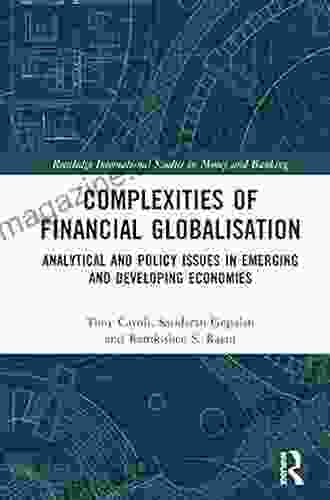Global Finance in Emerging Market Economies: A Comprehensive Guide for Practitioners and Policymakers

Emerging market economies (EMEs) have become increasingly important in the global economy in recent decades. They are now home to a large and growing share of the world's population and economic activity. As a result, the global financial system has become increasingly interconnected with EMEs. This has created both opportunities and challenges for EMEs and the global economy as a whole.
5 out of 5
| Language | : | English |
| File size | : | 2608 KB |
| Text-to-Speech | : | Enabled |
| Screen Reader | : | Supported |
| Enhanced typesetting | : | Enabled |
| Word Wise | : | Enabled |
| Print length | : | 329 pages |
This book provides a comprehensive overview of global finance in EMEs. It covers a wide range of topics, including the history of EMEs, the different types of financial systems that exist in EMEs, the challenges that EMEs face in developing their financial systems, and the role of international financial institutions in EMEs.
This book is essential reading for practitioners and policymakers working in EMEs. It provides a deep understanding of the global financial system and how it affects EMEs. It also offers practical guidance on how to develop and implement policies that can promote financial development in EMEs.
Chapter 1: The History of Emerging Market Economies
The first chapter of this book provides a brief history of EMEs. It discusses the different factors that have contributed to the emergence of EMEs and the challenges that they have faced over time.
The chapter begins by defining what an EME is. An EME is a country that has a relatively low level of economic development but is experiencing rapid economic growth. EMEs are typically characterized by high levels of poverty and inequality, but they also have the potential for high rates of economic growth.
The chapter then discusses the different factors that have contributed to the emergence of EMEs. These factors include:
* The global economic boom of the 1990s and early 2000s * The rise of China and other emerging economies * The development of new technologies * The liberalization of trade and investment policies
The chapter also discusses the challenges that EMEs have faced over time. These challenges include:
* Financial crises * Political instability * Corruption * Lack of access to finance
Despite the challenges that they have faced, EMEs have continued to grow and develop. They are now home to a large and growing share of the world's population and economic activity.
Chapter 2: The Different Types of Financial Systems in Emerging Market Economies
The second chapter of this book discusses the different types of financial systems that exist in EMEs. It identifies the key features of each type of system and discusses the advantages and disadvantages of each system.
There are three main types of financial systems in EMEs:
* Bank-based financial systems * Market-based financial systems * Mixed financial systems
Bank-based financial systems are characterized by a high level of concentration in the banking sector. A small number of banks control a large share of the financial assets in the country. Bank-based financial systems are often found in countries with a history of financial instability.
Market-based financial systems are characterized by a high level of competition in the financial sector. There are a large number of banks and other financial institutions that compete for customers. Market-based financial systems are often found in countries with a stable political and economic environment.
Mixed financial systems are a combination of bank-based and market-based financial systems. They have features of both types of systems. Mixed financial systems are often found in countries that are in transition from a bank-based financial system to a market-based financial system.
The type of financial system that is best for an EME depends on a number of factors, including the country's level of economic development, the stability of its political and economic environment, and the level of financial literacy of its population.
Chapter 3: The Challenges that Emerging Market Economies Face in Developing Their Financial Systems
The third chapter of this book discusses the challenges that EMEs face in developing their financial systems. These challenges include:
* Financial crises * Political instability * Corruption * Lack of access to finance
Financial crises can have a devastating impact on EMEs. They can lead to a loss of confidence in the financial system, a decline in economic growth, and an increase in poverty. EMEs are particularly vulnerable to financial crises because they often have weak financial systems and high levels of debt.
Political instability can also have a negative impact on the development of financial systems in EMEs. Political instability can lead to a lack of confidence in the government and the financial system. This can make it difficult for businesses to get loans and for investors to invest in the country.
Corruption is another major challenge that EMEs face. Corruption can lead to a misallocation of resources and a loss of confidence in the financial system. This can make it difficult for businesses to get loans and for investors to invest in the country.
Lack of access to finance is a major obstacle to economic development in EMEs. Many businesses and individuals in EMEs do not have access to formal financial services. This can make it difficult for them to get the financing they need to start or grow a business, or to invest in education or healthcare.
Chapter 4: The Role of International Financial Institutions in Emerging Market Economies
The fourth chapter of this book discusses the role of international financial institutions (IFIs) in EMEs. IFIs provide a number of important services to EMEs, including:
* Financial assistance * Technical assistance * Policy advice * Crisis management
Financial assistance is one of the most important services that IFIs provide to EMEs. IFIs can provide loans, grants, and other forms of financial assistance to EMEs. This assistance can help EMEs to stabilize their economies, promote economic growth, and reduce poverty.
Technical assistance is another important service that IFIs provide to EMEs. IFIs can provide technical assistance to EMEs in a number of areas, including:
* Developing and implementing financial sector reforms * Strengthening financial institutions * Improving financial regulation and supervision * Promoting financial inclusion
Policy advice is another important service that IFIs provide to EMEs. IFIs can provide policy advice to EMEs on a wide range of issues, including:
*
5 out of 5
| Language | : | English |
| File size | : | 2608 KB |
| Text-to-Speech | : | Enabled |
| Screen Reader | : | Supported |
| Enhanced typesetting | : | Enabled |
| Word Wise | : | Enabled |
| Print length | : | 329 pages |
Do you want to contribute by writing guest posts on this blog?
Please contact us and send us a resume of previous articles that you have written.
 Book
Book Novel
Novel Page
Page Chapter
Chapter Text
Text Story
Story Genre
Genre Reader
Reader Library
Library Paperback
Paperback E-book
E-book Magazine
Magazine Newspaper
Newspaper Paragraph
Paragraph Sentence
Sentence Bookmark
Bookmark Shelf
Shelf Glossary
Glossary Bibliography
Bibliography Foreword
Foreword Preface
Preface Synopsis
Synopsis Annotation
Annotation Footnote
Footnote Manuscript
Manuscript Scroll
Scroll Codex
Codex Tome
Tome Bestseller
Bestseller Classics
Classics Library card
Library card Narrative
Narrative Biography
Biography Autobiography
Autobiography Memoir
Memoir Reference
Reference Encyclopedia
Encyclopedia Matthew Schwartz
Matthew Schwartz Kes Gray
Kes Gray Kevin Dibacco
Kevin Dibacco Kathleen Flinn
Kathleen Flinn Kelly Treleaven
Kelly Treleaven Kenneth S Rogoff
Kenneth S Rogoff Kay Wills Wyma
Kay Wills Wyma Kenny Dill
Kenny Dill Kim Gordon
Kim Gordon Kay Laier
Kay Laier Kiki Prottsman
Kiki Prottsman Khadizhat Witt
Khadizhat Witt Ken Conboy
Ken Conboy Praise Daniels
Praise Daniels Kris Holloway
Kris Holloway Kim Barker
Kim Barker Katie Wolf
Katie Wolf Kelle Hampton
Kelle Hampton Ken Xiao
Ken Xiao Sharon Chriscoe
Sharon Chriscoe
Light bulbAdvertise smarter! Our strategic ad space ensures maximum exposure. Reserve your spot today!

 Douglas FosterBillions Selling To The New Chinese Consumer: The Ultimate Guide to Tapping...
Douglas FosterBillions Selling To The New Chinese Consumer: The Ultimate Guide to Tapping...
 Ryan FosterCraft Your Own Unique Railroad Spike Knife: A Comprehensive Guide to the Art...
Ryan FosterCraft Your Own Unique Railroad Spike Knife: A Comprehensive Guide to the Art...
 Brenton CoxTales of a Female Nomad: Embracing the Courage to Travel Solo and Transform...
Brenton CoxTales of a Female Nomad: Embracing the Courage to Travel Solo and Transform...
 Kurt VonnegutUnlocking the Secrets of Motivation: A Comprehensive Guide to Motivational...
Kurt VonnegutUnlocking the Secrets of Motivation: A Comprehensive Guide to Motivational... Jacob FosterFollow ·13.5k
Jacob FosterFollow ·13.5k Amir SimmonsFollow ·11.5k
Amir SimmonsFollow ·11.5k Rex HayesFollow ·15.9k
Rex HayesFollow ·15.9k Hayden MitchellFollow ·16.7k
Hayden MitchellFollow ·16.7k Elton HayesFollow ·15.7k
Elton HayesFollow ·15.7k Allen GinsbergFollow ·11.2k
Allen GinsbergFollow ·11.2k Ralph EllisonFollow ·2.3k
Ralph EllisonFollow ·2.3k Natsume SōsekiFollow ·17.5k
Natsume SōsekiFollow ·17.5k

 Joshua Reed
Joshua ReedUnveiling the Profound Essence of Taekwondo: Spirit and...
Taekwondo, an ancient...

 Clarence Brooks
Clarence BrooksUnveiling Clarity: The Common Sense Guide to Everyday...
In the labyrinthine world of legal...

 Anthony Wells
Anthony WellsBless Me, Ultima: A Literary Odyssey into the Heart of...
In the tapestry of American literature,...

 Alexandre Dumas
Alexandre DumasPioneer Life Or Thirty Years A Hunter - A Captivating...
Discover the Raw and...

 Samuel Beckett
Samuel BeckettThe Mike Fisher Story: An Inspiring Tale of Faith,...
Prepare to be...
5 out of 5
| Language | : | English |
| File size | : | 2608 KB |
| Text-to-Speech | : | Enabled |
| Screen Reader | : | Supported |
| Enhanced typesetting | : | Enabled |
| Word Wise | : | Enabled |
| Print length | : | 329 pages |






